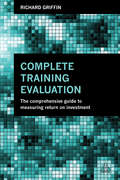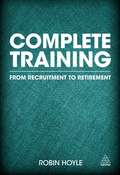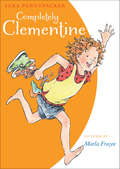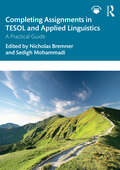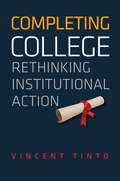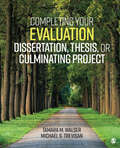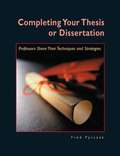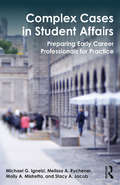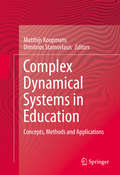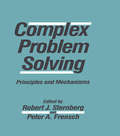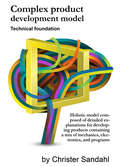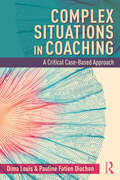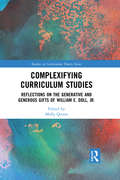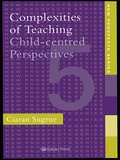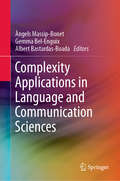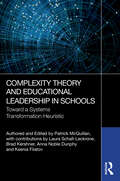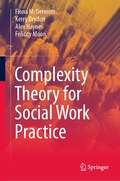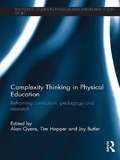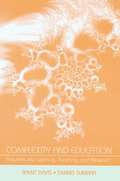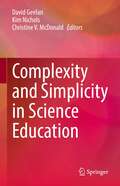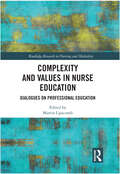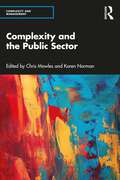- Table View
- List View
Complete Training Evaluation
by Richard GriffinWhile substantial advances have been made in the L&D profession over the last decade, evaluation remains by far the weakest part of the L&D cycle. Most organisations wish to evaluate the impact of their investment in training but few do it well, and the lack of effective methods is one of the key barriers. Complete Training Evaluation addresses these issues by providing practitioner friendly but academically robust information and guidance on how to evaluate all forms of learning and development. It draws on the author's own multidisciplinary research along with his practical experience of working with private and public sector organisations carrying out evaluation. The book provides practitioners with accessible 'how-to' knowledge and tools to undertake evaluations of both formal and informal learning. Full of case studies and practical examples of application of methods and insights, Complete Training Evaluation equips practitioners with a range of approaches that can be used depending on the training programme, capacity and capability.
Complete Training Evaluation: The Comprehensive Guide to Measuring Return on Investment
by Richard GriffinWhile substantial advances have been made in the L&D profession over the last decade, evaluation remains by far the weakest part of the L&D cycle. Most organisations wish to evaluate the impact of their investment in training but few do it well, and the lack of effective methods is one of the key barriers.Complete Training Evaluation addresses these issues by providing practitioner friendly but academically robust information and guidance on how to evaluate all forms of learning and development. It draws on the author's own multidisciplinary research along with his practical experience of working with private and public sector organisations carrying out evaluation. The book provides practitioners with accessible 'how-to' knowledge and tools to undertake evaluations of both formal and informal learning. Full of case studies and practical examples of application of methods and insights, Complete Training Evaluation equips practitioners with a range of approaches that can be used depending on the training programme, capacity and capability. An online supporting resource includes a bank of evaluation questions grouped around particular aspects of training.
Complete Training: From Recruitment to Retirement
by Robin HoyleThe training and development needs of any workforce vary dramatically between the generations and levels even so far as the style of communication needed to be effective.At the same time training budgets are tighter than ever before and training departments are increasing marginalised as informal learning in a cyber workplace grows. So how can you tackle the challenges of this environment effectively?Complete Training looks at the employee life cycle and posits a series of training challenges and opportunities relevant across each stage - from new hires to the éminence grise of the organisation - the objective is to enable learning and development practitioners to build individual capability and an organisation with a memory, continually learning from its own endeavours. By looking at how learning organisations succeed, complete training seeks to re-position L&D as central to the business, central to strategy and central to the organization's mission.
Completely Clementine (Clementine #7)
by Sara PennypackerThis delightful New York Times bestselling chapter book series, from the award-winning author of Pax, is a modern classic that has been keeping readers engaged and laughing as they follow the hijinks of Clementine, a clever and quirky third grader who&’s the most spectacular friend around. Perfect for fans of Amelia Bedelia and Ivy + Bean! Summer is coming, and Clementine is not ready. She is not ready to start speaking to her father again, because she's still mad at him for eating meat. Instead, she gives him drawings of animals she knows would not want to be somebody's dinner. Then there is the new baby on the way. Clementine's mom sure doesn't seem ready. She's suddenly crazy about cleaning (Dad says she is nesting), but she doesn't even have a name picked out yet. Clementine just hopes the baby won't be a dud. What Clementine really isn't ready for is saying good-bye to her third grade teacher. She knows Mr. D'Matz is going to tell her all kinds of things that aren't true. Everything else may be changing around her, but that doesn't mean that Clementine has. But which is worse, saying good-bye, or not saying good-bye?READ MORE!Clementine The Talented ClementineClementine&’s LetterClementine, Friend of the WeekClementine and the Family MeetingClementine and the Spring Trip
Completing Assignments in TESOL and Applied Linguistics: A Practical Guide
by Nicholas Bremner Sedigh MohammadiCompleting Assignments in TESOL and Applied Linguistics: A Practical Guide is an invaluable companion for anyone dealing with assignments in these fields.This hands-on guide walks students through every stage of assignment preparation, from unpacking assignment briefs and engaging in critical reading, to synthesising sources and developing academic writing. With clear, step-by-step guidance, each chapter addresses key skills while offering targeted support for specific assignment types, including: Critiquing a journal article, course, test or digital application Language analysis assignments Designing and justifying a lesson plan Reflective assignments Academic presentations Research proposals Contributions from educators and previous students worldwide provide balanced perspectives on tackling tasks that are enriched with real examples, feedback and reflective commentaries, as well as frequently asked questions. Designed to build confidence and competence, this accessible guide is essential for students aiming to succeed in TESOL, applied linguistics and related fields.
Completing College: Rethinking Institutional Action
by Vincent TintoEven as the number of students attending college has more than doubled in the past forty years, it is still the case that nearly half of all college students in the United States will not complete their degree within six years. It is clear that much remains to be done toward improving student success. For more than twenty years, Vincent Tinto’s pathbreaking book Leaving College has been recognized as the definitive resource on student retention in higher education. Now, with Completing College, Tinto offers administrators a coherent framework with which to develop and implement programs to promote completion. Deftly distilling an enormous amount of research, Tinto identifies the essential conditions enabling students to succeed and continue on within institutions. Especially during the early years, he shows that students thrive in settings that pair high expectations for success with structured academic, social, and financial support, provide frequent feedback and assessments of their performance, and promote their active involvement with other students and faculty. And while these conditions may be worked on and met at different institutional levels, Tinto points to the classroom as the center of student education and life, and therefore the primary target for institutional action. Improving retention rates continues to be among the most widely studied fields in higher education, and Completing College carefully synthesizes the latest research and, most importantly, translates it into practical steps that administrators can take to enhance student success.
Completing Your Evaluation Dissertation, Thesis, or Culminating Project
by Michael S. Trevisan Tamara M. WalserThis practical, user-friendly resource helps students successfully complete an evaluation capstone: a dissertation, thesis, or culminating project where a student conducts an evaluation as their capstone experience. Authors Tamara M. Walser and Michael S. Trevisan present a framework to support students and faculty in maximizing student development of evaluator competencies, addressing standards of the evaluation profession, and contributing to programs and disciplinary knowledge. Their framework, and this book, is organized by six fundamentals of evaluation practice: quality; stakeholders; understanding the program; values; approaches; and maximizing evaluation use. Throughout the book they use the metaphor of the journey to depict the processes and activities a student will experience as they navigate an evaluation capstone and the six fundamentals of evaluation practice. In pursuit of a completed capstone, students grow professionally and personally, and will be in a different place when they reach the destination and the capstone journey is complete.
Completing Your Evaluation Dissertation, Thesis, or Culminating Project
by Michael S. Trevisan Tamara M. WalserThis practical, user-friendly resource helps students successfully complete an evaluation capstone: a dissertation, thesis, or culminating project where a student conducts an evaluation as their capstone experience. Authors Tamara M. Walser and Michael S. Trevisan present a framework to support students and faculty in maximizing student development of evaluator competencies, addressing standards of the evaluation profession, and contributing to programs and disciplinary knowledge. Their framework, and this book, is organized by six fundamentals of evaluation practice: quality; stakeholders; understanding the program; values; approaches; and maximizing evaluation use. Throughout the book they use the metaphor of the journey to depict the processes and activities a student will experience as they navigate an evaluation capstone and the six fundamentals of evaluation practice. In pursuit of a completed capstone, students grow professionally and personally, and will be in a different place when they reach the destination and the capstone journey is complete.
Completing Your Thesis or Dissertation: Professors Share Their Techniques and Strategies
by Fred PyrczakIn Completing Your Thesis Or Dissertation, Fred Pyrczak has assembled advice and anecdotal examples from seventy-one university professors for students who are frustrated with, or fail to complete, their dissertations. The wealth of techniques and strategies offered will prove invaluable for anyone struggling to complete a thesis or dissertation regardless of subject matter or category of topic. The contributors cover all aspects of the thesis or dissertation process including defending the writing, getting help from others, goals and timelines, outside pressures, overcoming self-doubt and anxiety, the prospectus/proposalm reviewing the literature, rewarding oneself, selecting a committee and chair, selecting a topic, writing, work habits, working with the committe and chair, dealing with writer's block, and more. Completing Your Thesis Or Dissertation should be required reading for all students who are faced with the often daunting task of writing a thesis or dissertation.
Complex Cases in Student Affairs: Preparing Early Career Professionals for Practice
by Michael G. Ignelzi Melissa A. Rychener Molly A. Mistretta Stacy A. JacobComplex Cases in Student Affairs provides students and professionals with a deeper understanding of how problems in student affairs might be addressed through the application of relevant theory/research and practical considerations of professional practice. Featuring 22 original cases situated at a range of different types of institutions, this important text covers many functional areas, represents the experiences of a diverse set of student populations, and addresses a variety of complex and intersecting issues that student affairs professionals regularly face. A clear process for applying theory to practice along with case-specific questions prompts readers to engage with the issues presented in the cases, identify and analyze problems, and construct robust solutions. Whether you are a student affairs or higher education graduate student, faculty member, early student affairs professional, or staff supervisor, reading, analyzing, and crafting resolutions to the cases in this book will better prepare you to effectively consider and address the challenges of the field.
Complex Dynamical Systems in Education: Concepts, Methods and Applications
by Matthijs Koopmans Dimitrios StamovlasisThis book capitalizes on the developments in dynamical systems and education by presenting some of the most recent advances in this area in seventeen non-overlapping chapters. The first half of the book discusses the conceptual framework of complex dynamical systems and its applicability to educational processes. The second half presents a set of empirical studies that that illustrate the use of various research methodologies to investigate complex dynamical processes in education, and help the reader appreciate what we learn about dynamical processes in education from using these approaches.
Complex Problem Solving: Principles and Mechanisms
by Robert J. Sternberg Peter A. FrenschAlthough complex problem solving has emerged as a field of psychology in its own right, the literature is, for the most part, widely scattered, and often so technical that it is inaccessible to non-experts. This unique book provides a comprehensive, in-depth, and accessible introduction to the field of complex problem solving. Chapter authors -- experts in their selected domains -- deliver systematic, thought-provoking analyses generally written from an information-processing point of view. Areas addressed include politics, electronics, and computers.
Complex Product Development Model: Holistic model composed of detailed explanations for developing products containing a mix of mechanics, electronics, and programs
by Christer SandahlHave you ever tried to explain what quality is? Let's say you know perfectly well how to develop a quality product, but your arguments are undermined all the time by fragmented details. Time and again you have to step back to sort out the details, in order to make a renewed attack. But somewhere along the debate you get stuck. The details never get sorted out. There are too many of them, and you don't share their definitions. After an hour or two you give up, and you revert to the old way of working, although you know you could do so much better. Now there is a solution to your frustration. The complex product development model explains all details and puts them together into a holistic and consistent lodestar for all engineers, managers, and teachers dealing with development of products containing a mix of mechanics, electronics, and programs. This model is an update of best practices from the most applicable development models in the world, scrutinized through a lifetime of product development experience in local, regional, and international product development companies. This book explains Cpdm principles in-depth, with numerous real examples. Difficulties and complexities are illustrated by a wealth of drawings, figures, and tables. You can go back and forth to understand every aspect. Over a product's life cycle, development cost is seldom significant. Development time is sometimes important, but most often the crucial shortage lies in quality, capability, and predictability. The Cpdm toolbox is available—use it to win your debates and start to improve this industry forever.
Complex Situations in Coaching: A Critical Case-Based Approach
by Dima Louis Pauline Fatien DiochonComplex Situations in Coaching is a collection of 20 typical yet underdiscussed issues in coaching, ranging from value conflicts, multiple agendas, power dynamics, and emotion management, to the role of money, etc. Organized into ten chapters, they are positioned into the literature and commented on by world-class coaches, coaching researchers, educators, and program directors. This plurality of voices is designed to foster dialogue, questions, and solutions; this setting, supportive of reflexivity, critical thinking, and diversity awareness, is essential to the development and education of coaches in an increasingly complex world where ready-made solutions prove limited. Thus, beyond a 'toolkit approach', this book engages in a thought-provoking and multi-perspective journey in support of the professionalization and continuous education of coaches, instructors, and/or supervisors.
Complex needs: Assessing Functional Vision
by Croydon Sensory Support ServiceAssessment, functional vision, CVI CW: This is a set of documents used to assess a learners functional vision. Pack includes instructions and assessment forms for the following: * Awareness - Objects * Background detail * Contrast Sensitivity * Fixation * Following Objects - Tracking * Light 1 * Light 2 * Localisation * Searching - Scanning * Visual Recognition and discrimination * Visually directed reaching - movement
Complexifying Curriculum Studies: Reflections on the Generative and Generous Gifts of William E. Doll, Jr. (Studies in Curriculum Theory Series)
by Molly QuinnThe essays in this volume bring together leading-edge scholars to illuminate the work of William E. Doll, Jr., as a key curriculum thinker of global impact, and introduce his work and influence to new generations of scholars, teachers, and students of education. Drawing on their individual contexts, contributors cover a range of topics and themes, including engagement with pragmatism, the work of John Dewey, and the inclusion of post-modern, chaos, and complexity theories to education and curriculum. Advancing our understanding and conversation of existing problems and possibilities in education, this collection serves as both an homage to Doll and a call for action and consideration of what matters in education.
Complexities of Teaching: Child-Centred Perspectives (New Prospects Ser. #No.5)
by Ciaran SugrueFirst published in 2004. Routledge is an imprint of Taylor & Francis, an informa company.
Complexity Applications in Language and Communication Sciences
by Gemma Bel-Enguix Àngels Massip-Bonet Albert Bastardas-BoadaThis book offers insights on the study of natural language as a complex adaptive system. It discusses a new way to tackle the problem of language modeling, and provides clues on how the close relation between natural language and some biological structures can be very fruitful for science. The book examines the theoretical framework and then applies its main principles to various areas of linguistics. It discusses applications in language contact, language change, diachronic linguistics, and the potential enhancement of classical approaches to historical linguistics by means of new methodologies used in physics, biology, and agent systems theory. It shows how studying language evolution and change using computational simulations enables to integrate social structures in the evolution of language, and how this can give rise to a new way to approach sociolinguistics. Finally, it explores applications for discourse analysis, semantics and cognition.
Complexity Theory and Educational Leadership in Schools: Towards a Systems Transformation Heuristic
by Patrick McQuillan Laura Schall-Leckrone Brad Kershner Anna Noble Dunphy Ksenia FilatovThe research in this volume draws on aspects of complexity theory and its integral link to systems performance to propose a new method for combatting the longstanding opportunity gap and related underperformance of so many underserved students in the American educational system.Through a longitudinal case study of the Lynch Leadership Academy at Boston College, this research considers the initial conditions and related disequilibrium principals experienced, the degree to which principals shared power and authority within their school context, and the extent to which they generated a shared school culture founded on collaboration and systematic reflection. From these data, the authors create a detailed picture of the Academy and its impact on the principals and their schools, using a new analytic tool called the “systems transformation heuristic," designed by the authors to quantify the qualitative dimensions of a school’s efforts to enact adaptive change consistent with the complex adaptive system metaphor.As such, it offers a new foundation for conceptualizing ongoing systems change, as well as a fresh model for school personnel to consider their experience from concrete, intertwined, and unique points of view. It will appeal to scholars, researchers, and practitioners with interests in educational leadership, complexity theory, urban education, and social justice.
Complexity Theory for Social Work Practice
by Fiona McDermott Kerry Brydon Alex Haynes Felicity MoonThis textbook provides a grounding in complexity theory, demonstrating how it can influence and shape social work interventions in policy, management, and practice, as well as forming an epistemological and methodological basis for research. It provides a contemporary theoretical basis for social work practice, equipping social workers to work in a 21st-Century world. The authors argue that the history of social work demonstrates the profession's engagement with the social and structural problems of each era since its emergence 150 years ago. However, in the 21st Century, such things as globalisation, the COVID-19 pandemic, and climate change have highlighted that existing theories and practice models are insufficient to the task of working with the complicatedness of contemporary life in a fast-changing world. Distilling the central tenets of Complexity Theory and the notion of complex adaptive systems in partnership with pragmatism, the book provides practice perspectives and guidelines which build on social work's enduring commitment to understanding the person-in-context. The recognition that social workers require conceptual and theoretical agility to work across micro, meso and macro 'levels' remains central, but the argument is made that their focus and practice must primarily be at the meso level. The authorship of combined academic and practice expertise enables such perspectives to be brought to life through the theoretical and practical analysis of conceptual and 'real-world' challenges. The book consists of 13 chapters organized in three sections:Part I: Complex Practice in a Complex WorldPart II: Thinking Complexity in PracticePart III: Thinking Complexity in Public Policy, Research and EducationComplexity Theory for Social Work Practice encourages social workers to 'think complexity' and 'act pragmatically'. It is intended for final-year social work students; academics and researchers working in a range of disciplines, primarily in the social work field but also in the areas of sociology, psychology and anthropology; and practitioners in policy, research, management and practice settings.
Complexity Thinking in Physical Education: Reframing Curriculum, Pedagogy and Research (Routledge Studies in Physical Education and Youth Sport)
by Alan Ovens Tim Hopper Joy ButlerIn the past two decades, complexity thinking has emerged as an important theoretical response to the limitations of orthodox ways of understanding educational phenomena. Complexity provides ways of understanding that embrace uncertainty, non-linearity and the inevitable ‘messiness’ that is inherent in educational settings, paying attention to the ways in which the whole is greater than the sum of its parts. This is the first book to focus on complexity thinking in the context of physical education, enabling fresh ways of thinking about research, teaching, curriculum and learning. Written by a team of leading international physical education scholars, the book highlights how the considerable theoretical promise of complexity can be reflected in the actual policies, pedagogies and practices of physical education (PE). It encourages teachers, educators and researchers to embrace notions of learning that are more organic and emergent, to allow the inherent complexity of pedagogical work in PE to be examined more broadly and inclusively. In doing so, Complexity Thinking in Physical Education makes a major contribution to our understanding of pedagogy, curriculum design and development, human movement and educational practice.
Complexity and Education: Inquiries Into Learning, Teaching, and Research
by Brent Davis Dennis SumaraThis book explores the contributions, actual and potential, of complexity thinking to educational research and practice. While its focus is on the theoretical premises and the methodology, not specific applications, the aim is pragmatic--to present complexity thinking as an important and appropriate attitude for educators and educational researchers. Part I is concerned with global issues around complexity thinking, as read through an educational lens. Part II cites a diversity of practices and studies that are either explicitly informed by or that might be aligned with complexity research, and offers focused and practiced advice for structuring projects in ways that are consistent with complexity thinking. Complexity thinking offers a powerful alternative to the linear, reductionist approaches to inquiry that have dominated the sciences for hundreds of years and educational research for more than a century. It has captured the attention of many researchers whose studies reach across traditional disciplinary boundaries to investigate phenomena such as: How does the brain work? What is consciousness? What is intelligence? What is the role of emergent technologies in shaping personalities and possibilities? How do social collectives work? What is knowledge? Complexity research posits that a deep similarity among these phenomena is that each points toward some sort of system that learns. The authors’ intent is not to offer a complete account of the relevance of complexity thinking to education, not to prescribe and delimit, but to challenge readers to examine their own assumptions and theoretical commitments--whether anchored by commonsense, classical thought or any of the posts (such as postmodernism, poststructuralism, postcolonialism, postpositivism, postformalism, postepistemology) that mark the edges of current discursive possibility. Complexity and Education is THE introduction to the emerging field of complexity thinking for the education community. It is specifically relevant for educational researchers, graduate students, and inquiry-oriented teacher practitioners.
Complexity and Simplicity in Science Education
by David Geelan Christine V. McDonald Kim NicholsThis edited volume brings together a broad range of international science education studies, focusing on the interplay of teaching and learning science. It recognizes the complexity present in today’s education, associated with major science related issues faced by society, such as climate change, diseases and pandemics, global conflicts over energy, food and water.The studies discussed in this volume are focused on presenting different opportunities to teach these convoluted matters in order to find simplicity within the complexity and make it accessible to learners. They bring together the challenges of preparing the students of today to become scientifically informed citizens of tomorrow.
Complexity and Values in Nurse Education: Dialogues on Professional Education (Routledge Research in Nursing and Midwifery)
by Martin LipscombThis work explores the interplay of complexity and values in nurse education from a variety of vantages. Contributors, who come from a range of international and disciplinary backgrounds, critically engage important and problematic topics that are under-investigated elsewhere. Taking an innovative approach each chapter is followed by one or more responses and, on occasion, a reply to responses. This novel dialogic feature of the work tests, animates, and enriches the arguments being presented. Thought-provoking, challenging and occasionally rumbustious in tone, this volume has something to say to both nurse educators (who may find cherished practices questioned) and students. Given the breadth and nature of subjects covered, the book will also appeal to anyone concerned about and interested in nursing’s professional development/trajectory.
Complexity and the Public Sector (Complexity and Management)
by Chris Mowles Karen NormanSince the early 1990s, public sector organisations have been overwhelmed with what has come to be termed New Public Management (NPM) methods. NPM idealises performance, metrics, transparency and marketisation. This book explores some of the tensions which arise in institutions where NPM methods prevail, introduces different ways of thinking about the task of managing for public good and offers a radical challenge to the dominant assumptions regarding why and how professional communities of practice may (or may not) come to change their working practices. In this third book in the Complexity and Management series, the expert authors bring together their experiences to provide vibrant accounts of how to manage in everyday public sector organisational situations using practical judgement. The book includes a brief introduction to complexity and public sector management, real-world narratives illustrating concrete dilemmas in the workplace and a concluding chapter that draws together the practical and theoretical implications of a complexity perspective. With both theoretical grounding and practical insights from senior managers and consultants, the book provides an ideal resource for students on management or executive leadership programmes for the public sector, as well as managers in and consultants to the sector.
